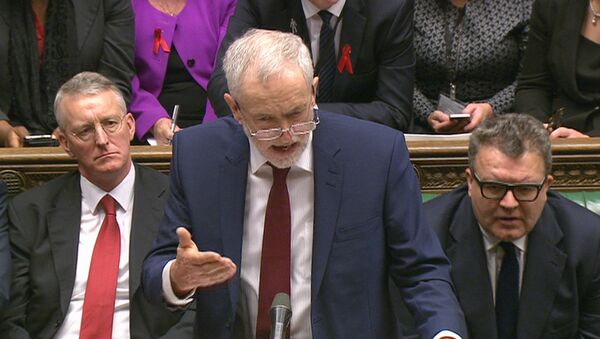UK Prime Minister David Cameron needed a majority vote in favor of the bombing, after his previous attempt to call for unity for military actions against Bashar al-Assad's forces in Syria failed in 2013. Crucial to Cameron's plan was backing from Labour Party lawmakers.
I believe the House has taken the right decision to keep the UK safe — military action in Syria as one part of a broader strategy.
— David Cameron (@David_Cameron) December 2, 2015
However, Labour leader Jeremy Corbyn is a fierce anti-war campaigner and argued against the airstrikes. He was forced to back down on ordering his lawmakers — using a three line whip — to vote against a bombing campaign when it became apparent that half of his shadow cabinet was against airstrikes.
British service men and women will now be in harm’s way and the loss of innocent lives is sadly almost inevitable pic.twitter.com/z338VAmIai
— Jeremy Corbyn MP (@jeremycorbyn) December 2, 2015
During an impassioned debate that lasted more than eleven hours Wednesday, lawmakers from all sides of the house argued for and against airstrikes. Corbyn himself gave a dignified argument saying:
"In my view, only a negotiated political and diplomatic endeavor to bring about an end to the civil war in Syria will bring some hope to the millions who have lost their homes, who are refugees, and who are camped out in various points all across Europe, dreaming of a day when they can go home.
"I think our overriding goal should be to end that civil war in Syria, and obviously also to protect the people of this country. I do not believe that the motion put forward by the Prime Minister achieves that," Corbyn said.
Two Leaders?
However, his thunder was stolen by his own shadow Defense Secretary Hilary Benn, who gave a barnstorming speech that attracted a cross-party standing ovation and clapping — a very unusual breach of parliamentary convention.
"Daesh is plotting more attacks, so the question for each of us and for our national security is this: given that we know what it is doing, can we really stand aside and refuse to act fully in self-defense against those who are planning these attacks? Can we really leave to others the responsibility for defending our national security? If we do not act, what message will that send about our solidarity with those countries that have suffered so much, including Iraq and our ally, France?" Benn said.
Meanwhile, veteran Labour lawmaker Frank Field suggested that it was time to have two Labour leaders — one elected by the whole party membership (as Jeremy Corbyn is) and another elected by lawmakers themselves to lead in parliament. He wrote in The Independent newspaper:
"It is quite clear that Jeremy Corbyn is the party leader in the country. Rather than splits, a much more favorable alternative might be for the Labour Party to have a leader elected by MPs and a leader in the country elected by the entire membership. Both would be key positions, but the electorate would be voting on the parliamentary team as an alternative government. How one gets there, of course, is another matter," wrote Field.


